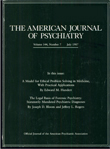Cognitive behavior therapy for chronic fatigue syndrome: a randomized controlled trial
Abstract
OBJECTIVE: Cognitive behavior therapy for chronic fatigue syndrome was compared with relaxation in a randomized controlled trial. METHODS: Sixty patients with chronic fatigue syndrome were randomly assigned to 13 sessions of either cognitive behavior therapy (graded activity and cognitive restructuring) or relaxation. Outcome was evaluated by using measures of functional impairment, fatigue, mood, and global improvement. RESULTS: Treatment was completed by 53 patients. Functional impairment and fatigue improved more in the group that received cognitive behavior therapy. At final follow-up, 70% of the completers in the cognitive behavior therapy group achieved good outcomes (substantial improvement in physical functioning) compared with 19% of those in the relaxation group who completed treatment. CONCLUSIONS: Cognitive behavior therapy was more effective than a relaxation control in the management of patients with chronic fatigue syndrome. Improvements were sustained over 6 months of follow-up.



